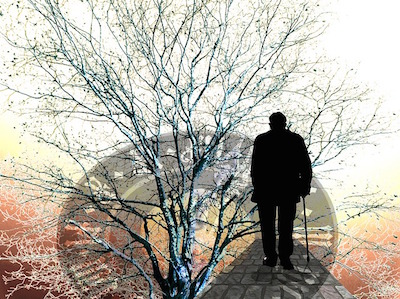As we age, our bodies change. Some of us discover we need reading glasses or even bifocals. Others realize that their hearing is not what it used to be and find themselves making a significant investment in hearing aids. Similarly, most seniors are aware that their memory is not as sharp as it once was. Car keys get misplaced. The names of famous people are sometimes hard to recall. Occasionally, a monthly payment is missed. When this happens people often find themselves wondering if they are experiencing typical aging memory loss or if their symptoms are signs of early Alzheimer’s or another form of dementia.

Memory loss that disrupts daily life is not a typical part of aging. Below is a list of warning signs created by the Alzheimer’s Association that alert us to be attentive to the changes we are experiencing. Individuals may experience one or more of these in different degrees.
- Challenges in planning and solving problems – Some people may experience changes in their ability to follow a plan, work with numbers, follow a familiar recipe or keep track of monthly bills.
- Difficulty completing familiar tasks at home, at work or at leisure – People with Alzheimer’s often find it hard to complete daily tasks. Sometimes they may have trouble driving to a familiar location or remembering the rules of their favorite game.
- Confusion with time and place – People with Alzheimer’s can sometimes lose track of dates and seasons. Other times they can forget where they are and not remember how they go there.
- Trouble understanding visual images and spatial relationships – For some people losing a sense of depth perception or determining color and contrast can be a sign of Alzheimer’s.
- New problems with words (spoken or written) – People with Alzheimer’s may have difficulty finding the right word for an object, may call items by a wrong name, or may have difficulty writing a short note or email message.
- Misplacing things and losing the ability to retrace steps – A person with Alzheimer’s may place items in unusual places (e.g. a purse in the shower or car keys in the freezer.) When items cannot be found others may be accused of stealing or taking the item.
- Decreased or poor judgement – A person with Alzheimer’s may forget to look left and right when crossing a street. My mother almost pushed her hand down the garbage disposal because it was making an odd sound that caught her attention.
- Withdrawal from work or social activities – Individuals with Alzheimer’s live with constant confusion. This may cause them to withdraw from social activities and discourage them from initiating a conversation.
- Changes in mood and personality – The mood and personalities of people with Alzheimer’s can change. They can become confused, fearful, suspicious, depressed or anxious.
People experiencing one or more of these changes should be attentive and speak to their health care provider. The changes might be brought on by dehydration, malnutrition, an infection, a brain tumor, depression or another treatable condition. They might also indicate the early stages of Alzheimer’s disease or other form of dementia. Only a medical diagnosis can determine the cause and source of the changes.
For more information about these warning signs or other issues related to memory loss, please visit alz.org or contact the Alzheimer’s Association by calling 1-800-272-3900.
Bill Hinrichs, associate director of programs and services diversity, inclusion & advocacy initiatives, Alzheimer’s Association Northeastern New York, 4 Pine West Plaza, Suite 405, Albany, N.Y. 12205. For more information, please call (518) 867-4999.
